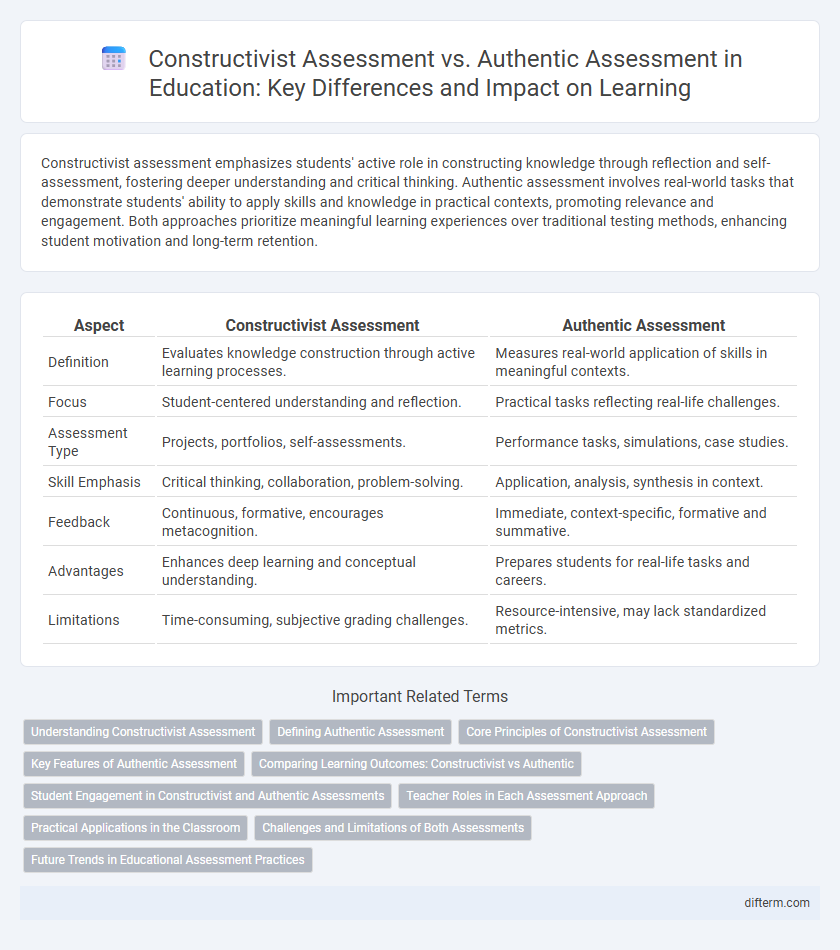Constructivist assessment emphasizes students' active role in constructing knowledge through reflection and self-assessment, fostering deeper understanding and critical thinking. Authentic assessment involves real-world tasks that demonstrate students' ability to apply skills and knowledge in practical contexts, promoting relevance and engagement. Both approaches prioritize meaningful learning experiences over traditional testing methods, enhancing student motivation and long-term retention.
Table of Comparison
| Aspect | Constructivist Assessment | Authentic Assessment |
|---|---|---|
| Definition | Evaluates knowledge construction through active learning processes. | Measures real-world application of skills in meaningful contexts. |
| Focus | Student-centered understanding and reflection. | Practical tasks reflecting real-life challenges. |
| Assessment Type | Projects, portfolios, self-assessments. | Performance tasks, simulations, case studies. |
| Skill Emphasis | Critical thinking, collaboration, problem-solving. | Application, analysis, synthesis in context. |
| Feedback | Continuous, formative, encourages metacognition. | Immediate, context-specific, formative and summative. |
| Advantages | Enhances deep learning and conceptual understanding. | Prepares students for real-life tasks and careers. |
| Limitations | Time-consuming, subjective grading challenges. | Resource-intensive, may lack standardized metrics. |
Understanding Constructivist Assessment
Constructivist assessment emphasizes active learning by engaging students in problem-solving and critical thinking tasks that reflect real-world scenarios. It prioritizes student-centered evaluation methods, such as portfolios and self-assessments, to gauge deeper comprehension and knowledge construction. This approach contrasts with authentic assessment by focusing more on the cognitive processes underlying learning rather than solely on applied skills and performance outcomes.
Defining Authentic Assessment
Authentic assessment evaluates students' abilities through real-world tasks that demonstrate meaningful application of knowledge and skills, contrasting with constructivist assessment's emphasis on learners constructing understanding through exploration and reflection. It prioritizes performance-based activities such as projects, presentations, and portfolios, designed to mirror professional and everyday challenges. This approach fosters deeper engagement by linking assessment directly to practical contexts and student experiences.
Core Principles of Constructivist Assessment
Constructivist assessment emphasizes active student engagement, where learners demonstrate understanding through problem-solving and critical thinking, reflecting their individual meaning-making processes. It prioritizes formative evaluation, ongoing feedback, and self-assessment to support deep learning and cognitive development. Core principles include learner-centered activities, authentic contexts, and assessments that promote reflection and meaningful knowledge construction.
Key Features of Authentic Assessment
Authentic assessment emphasizes real-world tasks that require students to apply knowledge and skills in meaningful contexts, promoting deeper understanding and critical thinking. It involves performance-based evaluations such as projects, portfolios, and presentations that reflect actual challenges outside the classroom. This approach prioritizes student reflection, engagement, and the integration of interdisciplinary knowledge, distinguishing it sharply from traditional constructivist assessments focused mainly on conceptual understanding.
Comparing Learning Outcomes: Constructivist vs Authentic
Constructivist assessment emphasizes students' ability to apply knowledge through problem-solving and critical thinking, promoting deeper conceptual understanding and transfer of skills. Authentic assessment focuses on real-world tasks that demonstrate practical application and relevance, enhancing engagement and long-term retention. Both approaches improve learning outcomes by fostering active participation and contextualized knowledge, but authentic assessment tends to better prepare students for real-life challenges.
Student Engagement in Constructivist and Authentic Assessments
Student engagement in constructivist assessment thrives through active exploration, collaboration, and reflection, promoting deeper understanding by connecting new knowledge with prior experiences. Authentic assessment heightens engagement by involving real-world tasks that require critical thinking and problem-solving, making learning relevant and meaningful. Both approaches foster intrinsic motivation by encouraging students to take ownership of their learning process and apply skills in practical contexts.
Teacher Roles in Each Assessment Approach
In constructivist assessment, teachers act as facilitators who guide students to reflect on their understanding and actively engage in self-assessment, promoting metacognitive skills. In authentic assessment, teachers serve as designers and evaluators of real-world tasks that require students to apply knowledge in practical contexts, emphasizing relevance and problem-solving. Both approaches position teachers as collaborators in the learning process, but constructivist roles emphasize student-centered inquiry while authentic assessment roles focus on contextualized skill demonstration.
Practical Applications in the Classroom
Constructivist assessment emphasizes learners actively constructing knowledge through hands-on projects and reflective activities, promoting deep understanding and critical thinking. Authentic assessment involves real-world tasks such as simulations, portfolios, and presentations that mirror practical challenges outside the classroom. Both methods foster student engagement and provide educators with meaningful insights into student learning progress and skill application.
Challenges and Limitations of Both Assessments
Constructivist assessment faces challenges in subjectivity and consistency due to its emphasis on learners' individual meanings and experiences, making standardized evaluation difficult. Authentic assessment often demands significant resources, time, and effort from educators for the design, implementation, and evaluation of real-world tasks. Both approaches may struggle with scalability and reliability when applied across diverse educational settings or large student populations.
Future Trends in Educational Assessment Practices
Future trends in educational assessment emphasize the integration of constructivist and authentic assessment approaches to create more meaningful evaluation experiences. Emphasizing real-world problem-solving and critical thinking, assessments are evolving to measure not just knowledge retention but also application, collaboration, and reflection. Advancements in adaptive learning technologies and data analytics enable personalized, formative feedback, aligning assessment practices with diverse learner needs and promoting lifelong learning skills.
constructivist assessment vs authentic assessment Infographic

 difterm.com
difterm.com